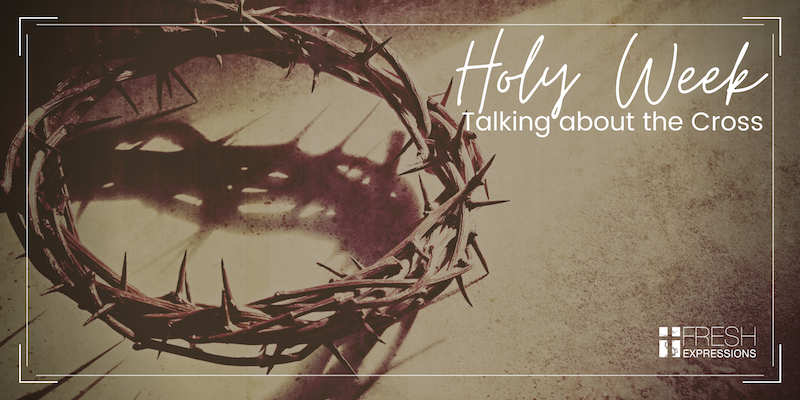We asked some FX Staff and Friends how they speak about the Cross, especially with unchurched folks. Here is Part One of some of the responses we got. Our hope is that these responses can provide you with some good food for thought, good ideas, and even spur some great conversations this Holy Week!
Watch Out for That Cliff
As Jesus was dying on the cross, He cried out, echoing the words of Psalm 22, which read “My God, my God, why have you abandoned me? Why are you so far away when I groan for help?”
What was happening here? What does it mean? And what does it mean for us, now?
The one who at multiple times in His life had heard the voice of God the Father saying “This is my beloved Son in whom I am well pleased,” the one who said He listened to His Father’s voice, now cried out the deepest question of His heart to heaven… and heard nothing back.
There’s a lot happening here beyond just merely a dying man quoting an ancient Psalm.
Every other time in the Gospels that Jesus speaks to God directly, He addresses Him as Father… but not here? Why? What does this mean?
To explain I need to take us out of the narrative just for a moment with a pretty mundane illustration. Imagine you are driving on the freeway and get pulled over and written a ticket for speeding. That’s a consequence, but it’s a particular kind of consequence- it’s arbitrary. You could have just gotten a warning. It’s also not a natural consequence- it’s not a given that if you speed you will get a ticket since there have been plenty of time you have done exactly that and suffered no consequences.
But now imagine that instead of speeding down the straightaway of the freeway, you are driving too fast over winding mountain roads in winter- you hit a curve that also happens to be icy and go over the side. Not only is that a worse consequence than a ticket- it’s a different kind of consequence. Someone else didn’t choose for you to go over the side- it was the cause–and–effect natural consequence of your own decision.
As Jesus cried out, and the word in Greek is more a “scream” or a “shriek” than simply using a loud voice- it’s clear He was in utter agony. And the agony was not simply one of physical pain, but of deep, emotional heart pain. The relationship God the Son had with God the Father, a relationship that existed for eternity past, had, for the moment, been split. Jesus was experiencing the natural consequence of sin- a broken relationship with God. Too often when we hear “consequence of sin,” we think of the first kind- the arbitrary penalty that someone in authority just chooses to impose. But the truth is when God warns of sin, He’s not saying “you’ll get a ticket because I’m not going to let you off with a warning,” He’s saying “I love you and don’t want you to go over the cliff. I want you to know the natural consequence of sin- separation from Me.” In the same way that the natural consequence of betrayal or infidelity is a broken relationship with one to whom we owe our loyalty but have betrayed, the natural consequence of idolatry, which all sin is at bottom level, is a broken relationship with the God to whom we owe our worship.
God was unwilling to let the consequence of our sin, separation, and death, have the last word. He loved us too much.
Tweet this.
And when John the Baptist saw Jesus and cried out “Behold the Lamb of God who takes away the sin of the world!” he was pointing forward to this event- this moment when Jesus would take on Himself all the consequences of our sin- when He would display just how awful our hatred and evil was by subjecting Himself to it, and how it led to death and broken relationship with His Father. The One, the only One, who had never sinned felt in this moment all the horrible consequences of all the horrible evils mankind has ever and will ever perpetrate. Why? For the simple reason that God was unwilling to let the consequence of our sin, separation, and death, have the last word. He loved us too much.
Neighborhood Stations of the Cross
Last year during Holy Week, with the nation confronting the virus with churches remaining closed for Sunday gatherings, our church created a walkable Stations of the Cross experience in the neighborhood around our church, based on Scott Erickson’s beautiful artwork. Each of the twelve large art pieces were hung on the homes of members of our church who lived throughout the neighborhood.
Signs were placed in each yard and included a QR code to scan in order to listen to a dramatic reading of a passage, a description of the painting, and directions to the next station — all from people’s cell phones. The entire experience took about 40 minutes and covered approximately 1 mile. It was a socially distanced, safe, meaningful, and family-friendly experience. Many people in our neighborhood, both religious and non-religious, participated in the experience by walking, biking, or driving

